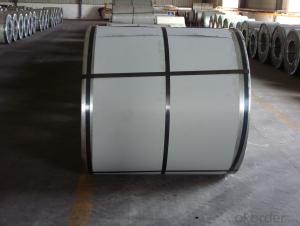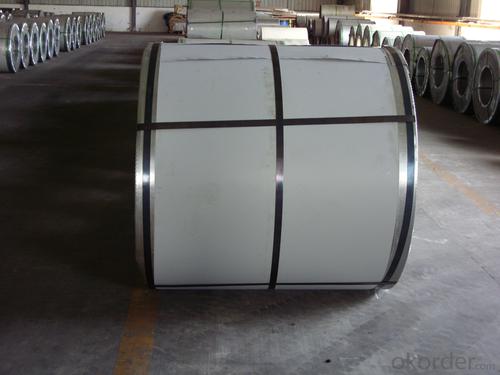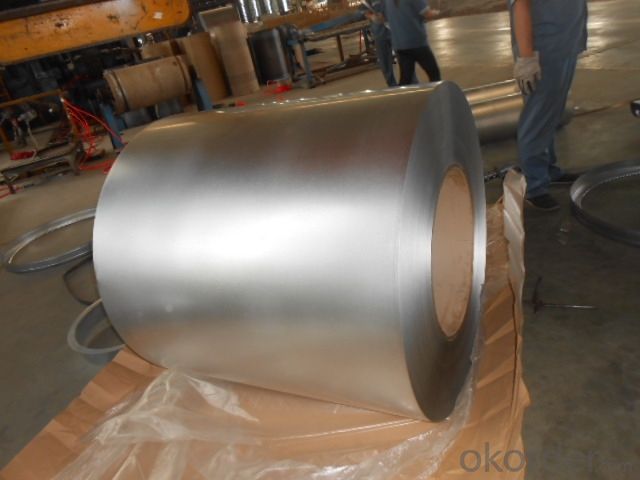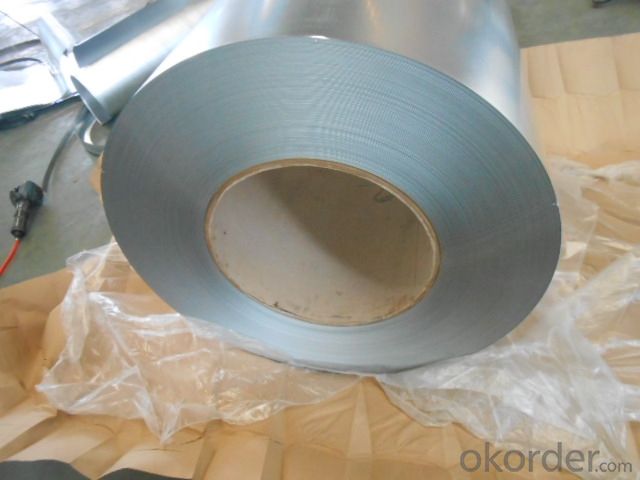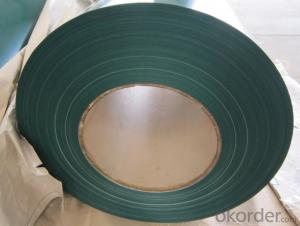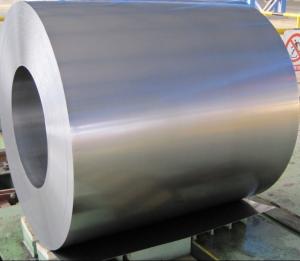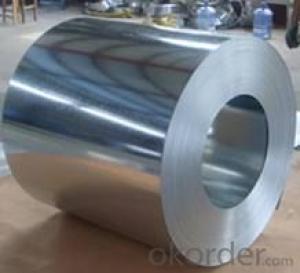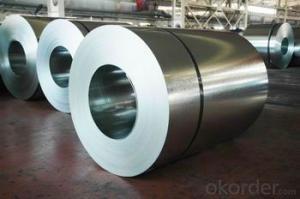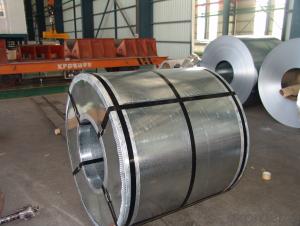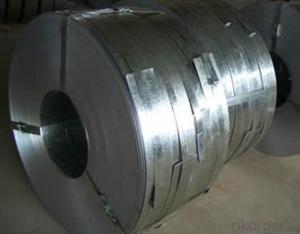GALVANIZED STEEL IN COIL
- Loading Port:
- China Main Port
- Payment Terms:
- TT OR LC
- Min Order Qty:
- -
- Supply Capability:
- -
OKorder Service Pledge
OKorder Financial Service
You Might Also Like
Product Description:
Commodity | Hot dip galvanized steel coil and sheet |
Technical Standard: | JIS 3302 / ASTM A653 / EN10143 |
Grade | DX51D / DX52D/ DX53D/ S250,280,320GD |
Types: | Commercial / Drawing / Deep Drawing / Structural quality |
Width | 500/650/726/820/914/1000/1200/1219/1220/1250mm |
Thickness | 0.12-2.8mm |
Type of coating: | Galvanized |
Zinc coating | Z30-275g/m2 |
Surface Treatment | Chromed / Skin-pass/ Oiled/Slightly Oiled/ Dry/ Anti-fingerprint |
Surface structure: | Zero spangle / minimized spangle / regular spangle/ big spangle |
ID coil | 508mm or 610mm |
Coil weight | 3-8 MT per coil |
Package: | Properly packed for ocean freight exportation in 20''containers |
Application: | Industrial panels, roofing and siding for painting |
Price terms | FOB,CFR,CIF |
Payment terms | T/T or L/C |
Delivery time | Within 30 days |
Remarks | Insurance is all risks |
MTC will be handed on with shipping documents | |
We accept the third party certification test,such as SGS/BV |
Technical data :
Hot dipped galvanized coil Technical Data
Chemical Composition | ||||||
GRADE | C | Si | Mn | P | S | Ti |
SGCC/DX51D+Z | ≤0.10 | ≤0.50 | ≤0.60 | ≤0.10 | ≤0.030 | ≤0.020 |
DX52D+Z | ≤0.10 | ≤0.50 | ≤0.60 | ≤0.10 | ≤0.030 | ≤0.020 |
SGCD/DX53D+Z | ≤0.10 | ≤0.30 | ≤0.50 | ≤0.05 | ≤0.030 | ≤0.020 |
SGCE/DX54D+Z | ≤0.10 | ≤0.30 | ≤0.30 | ≤0.03 | ≤0.020 | ≤0.020 |
DX56D+Z | ≤0.10 | ≤0.30 | ≤0.30 | ≤0.03 | ≤0.020 | ≤0.020 |
Structural | ≤0.20 | ≤0.60 | ≤1.70 | ≤0.10 | ≤0.045 | |
|
|
|
|
|
| |
Hot dipped galvanized steel coil Mechanical Properties | |||
GRADE | Yield Strength MPa | Tensile Strength MPa | Elongation % |
SGCC(DX51D+Z) | ≥205 | ≥270 | - |
SGCD(DX53D+Z) | - | ≥270 | 38 |
SGCE(DX54D+Z) | - | ≥270 | 40 |
DX56D+Z | - | ≥270 | 42 |
- Q: What are some characteristics of steel.
- Characteristics Of Steel Hardening. - The characteristic difference between steel and pure wrought iron is as follows: - When steel is raised to a red heat and then suddenly cooled, it becomes hard and brittle. This process, which is known as hardening, has no effect upon pure wrought iron. Tempering is a characteristic of steel which distinguishes it from cast iron. If steel has been hardened by being heated and suddenly cooled, as above described, it may be softened again by applying a lower degree of heat and again cooling. This is known as tempering. Cast iron, on the contrary, though it is hardened by the first process, cannot be softened by the second. When a bar of steel is struck it gives out a sharp metallic ring, quite different from the sound produced by striking wrought iron. Other characteristics of steel are its great elasticity and its retention of magnetism.
- Q: What are the industries that consume the most steel?
- I'm guessing manufacturing
- Q: Does anyone know the lyrics to steel driving man by Dailey and Vincent. I would really appreciate it
- I okorder /
- Q: Iron melts faster when there will be low carbon in Iron.During steel making the molten Iron gets purified and alloying being done through the process. How the carbon is being controlled at Iron melting stage and what it is called?
- Steel is usually made in a two-step process. As you may know, carbon, in the form of coke, is added to the iron ore during the initial smelting process. This is the first step. The conversion of iron ore into raw iron is accomplished with a blast furnace. Carbon dissolves with the iron during the smelting process. The amount of carbon in the iron is generally not controlled at this point as this would be too difficult, the excess carbon is removed in the next step. The result is pig iron which is crude iron that has a very high carbon content, and a large amount of impurities. Pig iron is almost as brittle as glass, and it is useless in this form. In most modern steelmaking operations, molten pig iron is tapped from the blast furnace three or four times per day- it is not allowed to cool. The liquid pig iron is carried in ladles directly to a Basic Oxygen Furnace which converts the pig iron into steel. The basic oxygen converter uses a stream of pure oxygen to burn off the excess carbon. Impurities are also burned off, particularly phosphorus, silicon, and sulfur (which damage the steel's properties.) These elements all have a much higher affinity for oxygen than iron does, so the iron itself remains unchanged. Once the carbon content and the impurities are reduced to the desired level. The oxygen is shut off, and the iron has now become steel. At this point other alloying elements may be added, such as chromium, manganese, or molybdenum. These elements improve the steel's properties, but also add to it's price. If necessary, more carbon can be added as well if the carbon content has accidentally dropped too low. Finally, molten steel from the basic oxygen furnace is poured off. It can be cast into ingots, billets, or thin slabs.
- Q: What are the common methods of cutting steel coils?
- The common methods of cutting steel coils include shearing, slitting, and laser cutting. Shearing involves using a machine with two blades to cut through the coil. Slitting involves passing the coil through a set of rotating circular blades to create narrower strips. Laser cutting uses a high-powered laser beam to cut through the steel coil with precision.
- Q: How are steel coils used in the production of transportation equipment?
- Steel coils are used in the production of transportation equipment as they provide the necessary strength and durability required for components such as chassis, frames, and body panels. These coils are shaped, cut, and welded to create different parts, ensuring the structural integrity and safety of vehicles such as cars, trucks, and trains.
- Q: the comparison needed between other steel
- BECAUSE IT HAS HIGH STRENGTH. IT HAS HIGH TOUGHNESS IT HAS LOW PERCENTAGE OF CARBON 0.05% TO 0.30% CAN BE USED AS GEARS,CRANKSHAFT
- Q: I had a damascus steel katana made for me and was wondering if I could put gun blue on it to make the steel black and it still work right
- There are many makers that use blue on there Damascus. My question, what the heck are you wanting to mess with the finish for? If you had a true Damascus blade made that that thing cost a fortune, and I don't mean under a grand either. Then there is the question of what it is made from, some steel combinations react well to the gun blue, others not so much. If it is a stainless blade it won't work at all and you shouldn't be using it either. I can tell you, my Damascus blades start at $100 for a small cable knife and go up from there. If you wanted a sword it would push 10 g's easy. None of my customers would mess with the finish, most would cry if it got scratched. If it's has a pretty pattern don't mess with it.
- Q: How do steel coils contribute to the manufacturing of electrical equipment?
- Steel coils are used in the manufacturing of electrical equipment as they provide structural support and enhance the durability of various components. They are commonly used in transformers, motors, and generators, where they serve as the core material due to their magnetic properties. The steel coils help to create and maintain magnetic fields, ensuring efficient energy transfer and enhancing the overall performance of electrical equipment.
- Q: where can you find carbon steel in los angeles?? what store?? preferabbly 01 carbon steel
- McMAster-Carr is a good catalog supplier of everything. Shipping for this stuff will be expensive. Talk to steel places near where you live. Carbon steel is not very descriptive. Structural steel is perhaps the most common, it has carbon in it, but people know it as ASTM A36 (36,000 yeild). You might talk to the steel people about your application to see what would be the cheapest for your application.
Send your message to us
GALVANIZED STEEL IN COIL
- Loading Port:
- China Main Port
- Payment Terms:
- TT OR LC
- Min Order Qty:
- -
- Supply Capability:
- -
OKorder Service Pledge
OKorder Financial Service
Similar products
Hot products
Hot Searches
Related keywords
